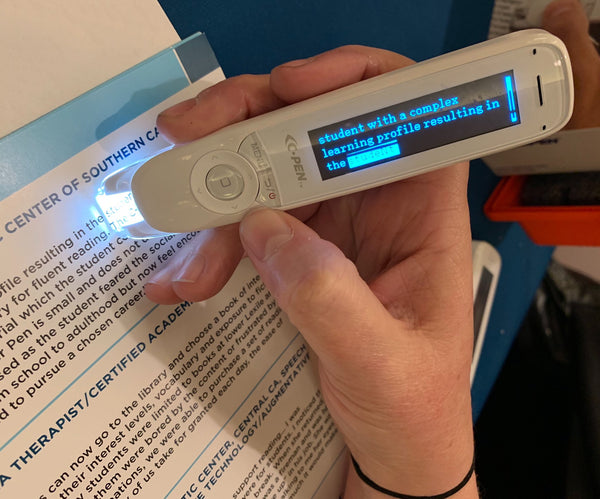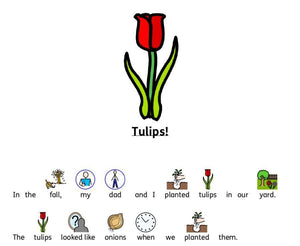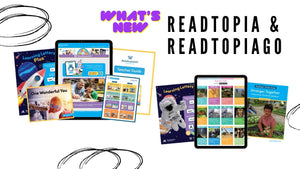Discreet, Reliable – ReaderPens' User Stories in Workplace, Post-secondary Transitions

Portable, discreet, simple, C-Pen ReaderPens fulfill a need for assistive technology even in the age of ubiquitous computer and internet access.
In this post we share real world experiences of Canadians using ReaderPens to support key lifelong learning transition stages: high-school to post secondary, college and university to the workplace, and adult learners upgrading skills for new careers.
Look for a future post that will profile middle-school students when often a reading challenge first becomes apparent, and the timeliness of an intervention is so important.
Alleviating Anxiety in High School
Even with the ubiquity of apps-in-the-cloud and laptops, computer based assistive technologies alone, might not have the flexibility high school or post-secondary students need. Particularly in programs that have work placements.
The self-contained, focused design of the ReaderPens makes it as inconspicuous as it is effective. That’s one of the key reasons we see consistently quick up-take of this assistive technology with high school students who might be resistant to any AT.
Susan Deley a SERT at Pelican Falls First Nation High School in Northern Ontario echoes observations we have often heard from educators in secondary schools who use the ReaderPens.
"…students in my school love the fact that we don’t need Wi-Fi to use them. Their use has alleviated student anxiety, is a great tool to boost students’ confidence, and has allowed them to obtain a level of independence by using the text to speech ReaderPen to access printed content."

Desk-free AT for College, Co-Ops and Apprenticeships
For a student who is preparing a career with a lot of desk work, cloud or PC based assistive technology is a practical accommodation.
However, although textbooks in colleges and universities have become increasingly available in digital formats, reading materials in work placements are another story.
Common challenging scenarios include:
- A manual for assembling and testing new machinery for an engineering tech.
- Policies and procedures for a specific childcare centre for an early childhood educator.
- Manufacturers’ documentation for an automotive or appliance repair apprentice.
Toby Marritt, an accessibility counsellor at Mohawk College in Hamilton Ontario, observed that the training process required of computer based assistive technologies needs to be considered when evaluating a support for a specific student.
She found that the ReaderPen was a “very effective accommodation when working with an apprentice with severe reading challenges. The pen helped the apprentice access reading materials… as the apprentice had little time for training."
But this effectiveness could extend even to areas of study with substantial academic demands such as nursing. Jody Beresford, Learning Strategist at New Brunswick Community College observed:
"I ordered the pen for a student in the Practical Nurse program. She really liked the fact that the pen was able to accurately pronounce most of the medical terms as well as prefixes and suffixes."

University: Complimenting Computer AT
Post-secondary students in university, appreciate the portability and immediate support that is inherent in the ReaderPen design. For them, their ReaderPen compliments their computer based assistive technology.
Marie McCarron, a student at Queen’s University, Kingston said of her experience with the ReaderPen:
"I like the features of being able to load your text right onto a computer, and also to speak into it, if there is added information that you want.”

And of course, the inconspicuous, discreet design is so important. Any accommodation, no matter the potential, has zero value if it is not actually used.
Dr Allyson Harrison, the clinical director at the Regional Assessment and Resource Centre at Queen’s, who specializes in academic accommodations for ADHD, learning disabilities, autism spectrum disorder and other challenges, connects how easy access is such an important factor to an accessibility tool’s success.
"The scanning pens are very accessible; you can bring it with you everywhere and it doesn’t necessarily look like you stand out, as opposed to having to bring your computer… (Students who have used the C-Pen) have said it’s brilliant. It has changed their life.”
ReaderPens and Adult Learners
The adult learners at Miramichi Adult Learning Inc. found that the C-Pen ReaderPens “opened a whole new world of discovery.” They noted six specific benefits of the ReaderPens:
- Self-directed learning showed strong improvement.
- Compensatory learning style is enhanced with auditory scan decoding.
- ReaderPens allows for immediate understanding so that the adult students could complete tasks required.
- Reduced the barriers to read and comprehend written text.
- Improved sense of self-esteem... "I can learn."
- Eliminated the need for tutor assistance.
At SIIT (Saskatchewan Indian Institute of Technologies) both post-secondary and adult basic education students love the independence of the ReaderPens.
They use the pens as an exam accommodation at SIIT. With a human exam reader, students might ask to have text read, but they might not request that a question or a specific word or phrase be repeated. But with the ReaderPen students can listen to the questions as many times as necessary without feeling self-conscious.
And with the specific wi-fi free functionality of the technology, concerns about comprising a hi-stakes exams’ fidelity are eliminated.
Nicole Wagner, a SIIT Learning Specialist found that, “having a dictionary on board is especially helpful when encountering unfamiliar vocabulary.”
She went on to conclude:
“The ReaderPen has been able to increase the confidence and success of our students.”
- Bogdan Pospielovsky





Comments 0